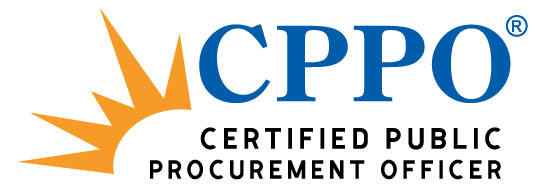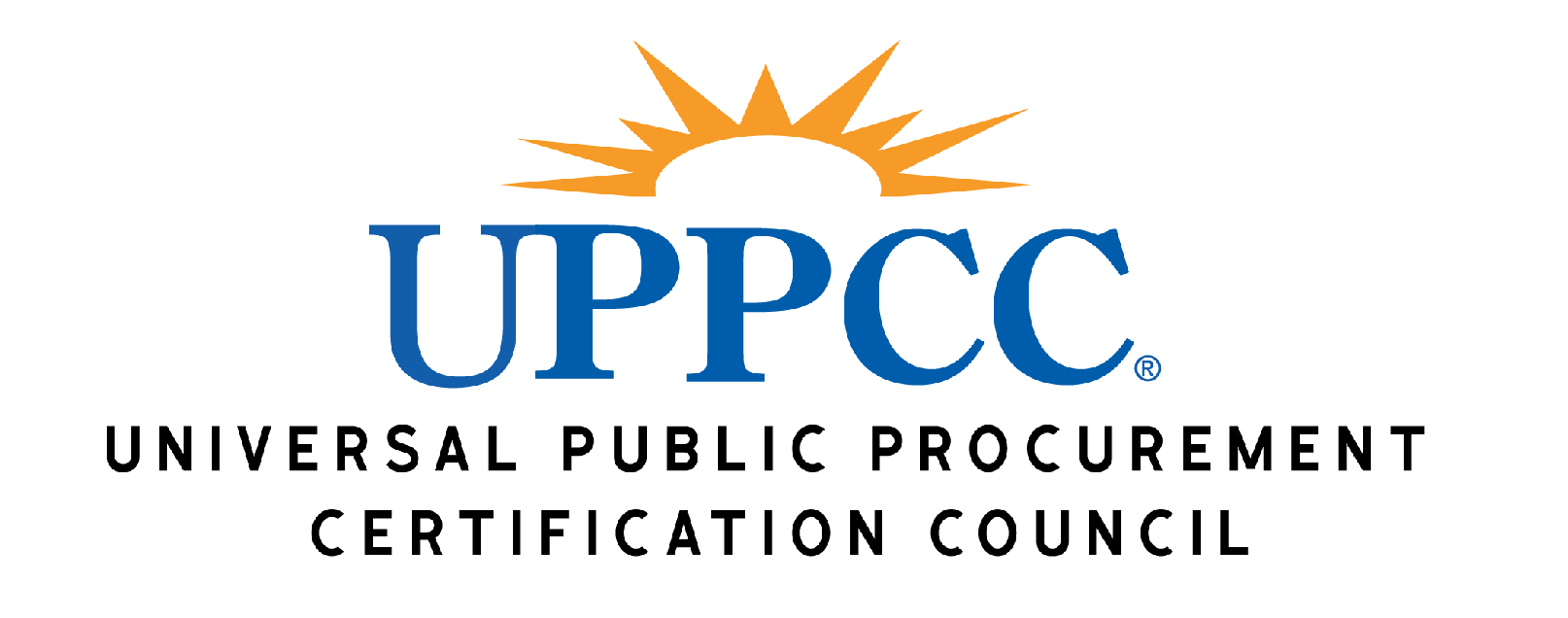CPPO Certification Program

The CPPO program is geared towards individuals in leadership and management positions within a public/governmental entity. These individuals may or may not be performing the buying for the public entity, but do either supervise a staff of buyers, the procurement department, the public agency, etc. or manage at least one essential function of the procurement cycle (i.e. contracting).
-
Eligibility Requirements
- Bachelors Degree or higher earned from an accredited institution of higher learning
- 5 years of procurement experience within the previous 10 years from the applications submission date of which a minimum of 3 years is in a management or supervisory position. A minimum of 50% of the required years of experience must be in public sector (remaining experience may be from either public or private sector), and
- 96 contact hours of procurement-related coursework/training completed within the previous 10 years from the applications submission date.
- Active CPPB Certification
- 10 years of experience within the previous 15 years from the applications submission date of which a minimum of 6 years is in a management or supervisory position. A minimum of 50% of the required years must be in public sector (remaining experience may be from either public or private sector).
- 96 contact hour of procurement-related coursework/training completed within the previous 10 years from the applications submission date.
-
Application Process
- To apply for CPPO, you will need to create a MyUPPCC account or update your existing account if you are already certified or have applied previously. The online application is only available via a MyUPPCC account and will serve as your central communication portal for your certification. Make sure to keep your information current so that you receive important reminders and other information to help guide you through your path to certification.
Education, training and employment experience are presented as eligibility requirements that are validated via an application process, while knowledge, skills and abilities are validated by examination. Those individuals whose qualifications meet or exceed the established standards become certified and are issued a credential, such as CPPO and CPPB and are authorized to hold themselves out to the public as certified. Certification requires periodic recertification to maintain the certification. Overtime, such credentials convey a level of excellence and prestige within a given field of practice.
The goal of certification is to increase professionalism in a field of practice. It identifies standards for practice, recognizes those who meet the standard and through recertification requires certified individuals to continue to meet standards as they evolve through ongoing professional development activities.
It’s a good idea to start the application process early and begin collecting the documentation that will be required for your application. Official position descriptions are required to support procurement work experience and completion certificates or other evidence of completion is required to support all coursework/training hours completed. An official college transcript is required to document the Bachelor’s degree requirement or any formal college level coursework completed.
Advanced application is required. Consult The Exam Schedule for specific dates.Once the application has been approved, applicant must complete the Special Exam Day Accommodation Request application and pay the Exam Scheduling Fee to move onto the testing phase.
Preparation is important and the CPPO BOK (Body of Knowledge) is your best resource. The CPPO BOK will guide your preparation efforts as it provides a comprehensive listing of the content that you will find on the exam as well as the number of questions that will be presented from each of the content domains that comprise the CPPO BOK.
Following payment of the Exam Scheduling Fee, the candidate will receive instructions on how to schedule an examination in the form of an Authorization To Test (ATT). ATT notifications are posted to MyUPPCC accounts.
Be sure to follow the instructions provided in your ATT notification to schedule your testing appointment by the posted exam scheduling deadline. Candidates will be able to select a testing appointment at a Prometric testing center at a date and time of their choosing based on availability within the designated 2-week testing window.
Arrive and sit for your scheduled examination appointment. Test results are made available and posted to MyUPPCC accounts within 6-8 weeks following the close of the scheduled testing window.
Candidates who successfully pass the examination are issued the credential, a printed certificate and digital badge for their achievement and are also listed as certified in the public directory of UPPCC Certified Individuals. Display your CPPO achievement proudly and maintain it by recertifying every 5 years.
-
Certification Fees
Application
fee$390 App Fee Rate
$440 Late App Fee Rate$290 Discount App Fee Rate*
$340 Discount Late App Fee Rate*Examination
fee
$325*Discount rates apply to all UPPCC Partner members. Click here for more on becoming a UPPCC Partner.
-
Exam Schedule
All UPPCC certification examinations are administered via computer at a Prometric testing center. Examinations will be delivered daily, Monday thru Saturday at a time and location selected by the candidate. Fall examinations are administered during the last two full weeks in October. Spring examinations are administered during the first two full weeks in May.
-
Preparing for the Exam
Candidates preparing for the CPPO examination should review the updated UPPCC Body of Knowledge & Competency (BoK-C). The BoK-C represents the identified knowledge, skills, and abilities that are essential to successful performance as a manager or supervisor of the public procurement function.
The CPPO examination covers the six (6) major content domain areas found in the current BOK-C. The percentage listed to the right of each major domain area represents the percentage of the exam that will cover topics from that specific domain area.
Candidates should keep in mind that the certification examinations are based on a broad body of knowledge in the field of public procurement, representing a variety of positions within the profession. The candidate may have expertise in their specific job but should consider all the other positions that are part of the procurement cycle when preparing for testing.
Candidates should review the BOK-C while performing a self-assessment of their individual strengths and weaknesses of the subject matter to be tested. Candidates should study all six domain areas, concentrating on those areas identified by the candidate as areas of weakness and those areas that are heavily weighted on the exam.
Authoritative Literature used for the exams and other training resources can be found in the Certification Guide by clicking the Certification Guide button below.
-
The Examination
The CPPO exam is a single, comprehensive assessment consisting of 175 multiple-choice questions covering the 6 content domain areas identified in the CPPB BoK-C (Body of Knowledge & Competency). Each test question presents a candidate with 4 options of which only one option is correct. Candidates are permitted a total of 3.5 hours in which to complete the exam. There are no scheduled breaks, but a candidate is not prevented from taking unscheduled breaks within the allotted 3.5 hours of testing time. CPPO exam questions are designed to test candidates on the content of the CPPO BoK-C as it relates to the role of a procurement manager and/or supervisor. The exam consists primarily of situational, process-oriented questions that require a candidate to be able to apply their knowledge of topics found in the BoK-C to responding appropriately to real world situations and problems.
-
FAQs
Yes. Bachelor’s Degrees earned from either a U.S. regionally or nationally accredited, post-secondary institution of higher learning (or the international equivalent) satisfies the Bachelor’s Degree requirement.
If you earned your Bachelor’s Degree from a college or university in Canada, your degree is considered equivalent if the institution where you received your degree is accredited by the Ministry of Education in the Canadian province or territory in which the institution is located. For Bachelor’s Degrees earned outside the U.S. and Canada, an evaluation from a 3rd party education evaluation service is required to determine if the earned degree is equivalent to a Bachelor’s degree from either a regionally or nationally accredited college or university in the U.S. Before incurring the expense of a formal education equivalency evaluation, WES offers a free, preliminary degree-equivalency evaluation tool on their website. To access the free tool, visit www.wes.org/wes-tools
Yes, only 50% of the total years of experience requirement must be from public sector. The remaining years may be from either public or private sector. For example, if the total years of procurement experience requirement required is 5 years, a minimum of 2.5 years must be from private sector as long as all experience is within the previous 10 years.
No, there is no requirement for the college or university to be accredited for the associated education to qualify for credit; however, an official transcript is still required as documentation of completion.
Each credit hour of formal education is equivalent to 16 contact hours; therefore a 3 credit hour course is equicalent to 48 contact hours.
Coursework/training completed more than 10 years prior is not considered relevant to the practice of procurement as it exists today and are therefore excluded for earning credit.
